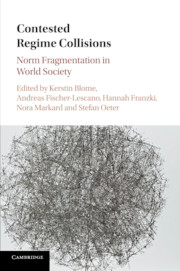Book contents
- Contested Regime Collisions
- Contested Regime Collisions
- Copyright page
- Contents
- Contributors
- Preface
- Contested collisions
- Part I Between collisions and interaction
- 1 Regime collisions from a perspective of global constitutionalism
- 2 How to avoid regime collisions
- 3 Regime-interplay management
- 4 Responsive legal pluralism
- Part II Addressing collisions
- Part III Collisions otherwise
- Index
- References
3 - Regime-interplay management
Lessons from environmental policy and law
from Part I - Between collisions and interaction
Published online by Cambridge University Press: 05 May 2016
- Contested Regime Collisions
- Contested Regime Collisions
- Copyright page
- Contents
- Contributors
- Preface
- Contested collisions
- Part I Between collisions and interaction
- 1 Regime collisions from a perspective of global constitutionalism
- 2 How to avoid regime collisions
- 3 Regime-interplay management
- 4 Responsive legal pluralism
- Part II Addressing collisions
- Part III Collisions otherwise
- Index
- References
- Type
- Chapter
- Information
- Contested Regime CollisionsNorm Fragmentation in World Society, pp. 88 - 108Publisher: Cambridge University PressPrint publication year: 2016
References
- 5
- Cited by



